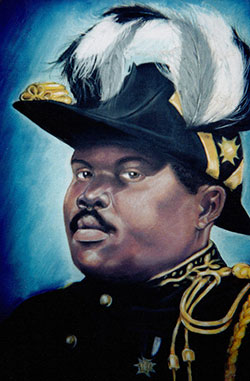By Melvin P. Foote
The Congressional Black Caucus and 18 others from Congress, Nelson Mandela’s grandson, Ndaba Mandela, and additional prominent people and organizations have written letters urging President Barack Obama to grant a posthumous pardon to historic civil rights leader Marcus Garvey. In 1923, Garvey was wrongfully convicted after being targeted by J. Edgar Hoover. With a following of over 6 million people, his uplifting message of black pride, self-reliance, economic independence and unity was considered a threat to the status quo.
Now nearly 100 years later, it is time to right this wrong.
Garvey launched the Universal Negro Improvement Association and African Communities League (UNIA-ACL) in 1914. He rose to become the undisputed forerunner of the civil rights movement and an anti-colonial champion in the Caribbean and Africa, influencing trailblazers who would become historic figures, including Kwame Nkrumah of Ghana, Jomo Kenyatta of Kenya and Nelson Mandela. In the U.S., it was Garvey who set the stage for the social justice and civil rights movements to follow from Malcolm X to the Rev. Martin Luther King Jr. to Black Lives Matter. He was also influential in the formation and progress of my organization, Constituency for Africa.
Garvey started the first black newspaper to inform black diaspora on issues that concerned them for the purpose of empowering them. At the time of his leadership, only 50 years had passed since the end of slavery. Garvey set out to disseminate information that would give blacks across the world hope and a pathway to progress, development and empowerment. His message was a simple one: that blacks are beautiful and smart and we can be self-reliant, economically independent and move forward with dignity and unity if we come together. In August 1920, an estimated 25,000 black people attended the opening of his convention at New York’s Madison Square Garden with delegations from 25 African countries. They deliberated the entire month and promulgated the Declaration of the Rights of the Negro People of the World and a structure for international unity for African people.
Garvey’s leadership and ideas caused J. Edgar Hoover, head of what would become the FBI, to write in a memorandum documented by Garvey biographer Rupert Lewis, “Garvey is a West-Indian Negro and in addition to his activities in endeavoring to establish the Black Star Line Steamship Corporation, he has also been particularly active among the radical elements in New York City in agitating the negro movement. “Unfortunately, however, he has not yet violated any federal law whereby he could be proceeded against on the grounds of being an undesirable alien, from the point of view of deportation. It occurs to me, however, from the attached clipping that there might be some proceeding against him for fraud in connection with his Black Star Line propaganda. …”
Advertisement (1 of 1): 0:06
While Hoover ran surveillance and infiltrated Garvey’s events, he found no basis to prosecute Garvey, so he went after his business. In 1923, Garvey was wrongfully convicted and imprisoned for nearly three years for mail fraud. The trial was full of judicial misconduct, documented perjury, a biased judge and an empty envelope. After serving nearly three years in prison, his sentence was commuted by President Calvin Coolidge after a recommendation by his U.S. attorney general and with the support of nine of the 12 jurors who voted to convict. He was deported and never returned to the U.S. again.
As founder and president of Constituency for Africa, I believe our key purpose is to improve cooperation and coordination among organizations and institutions that work on African issues, and to educate and mobilize the U.S. public on matters pertaining to Africa and the African diaspora. Following Garvey’s vision, my organization’s achievements in advocacy education have led to a greater understanding and awareness of Africa and have uplifted the African diaspora.
Marcus Mosiah Garvey was ahead of his time and because of that he was targeted, unjustly charged and convicted. It is time to remove the stain from this great man’s life, leadership and legacy with a posthumous presidential pardon. It’s time.
Melvin P. Foote is founder and president of the Constituency for Africa, a 26-year-old organization educating and mobilizing the U.S. public on matters pertaining to Africa and the African diaspora. i belie















